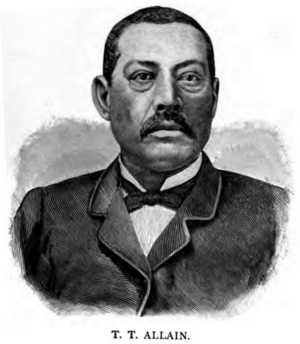Theophile T. Allain facts for kids
Quick facts for kids
Theophile T. Allain
|
|
|---|---|
 |
|
| Member of the Louisiana House of Representatives from District 14 |
|
| In office 1872–1874 |
|
| Member of the Louisiana Senate from District 14 |
|
| In office 1875–1878 |
|
| Member of the Louisiana House of Representatives from District 14 |
|
| In office 1879–1886 |
|
| Personal details | |
| Born | October 1, 1846 West Baton Rouge Parish, Louisiana, U.S. |
| Died | February 2, 1917 (aged 70) Chicago, Illinois, U.S. |
| Political party | Republican |
| Occupation | Politician |
Theophile T. Allain (born October 1, 1846 – died February 2, 1917) was an important politician in Louisiana during the late 1800s. He worked hard to improve schools and develop his community. He also helped update the Mississippi River levees, which are walls built to prevent floods. Later, he moved to Chicago and continued to fight for civil rights, which means equal rights for all people. For a while, he was one of the wealthiest African Americans in Louisiana.
Contents
Theophile Allain's Early Life
Theophile Terrence Allain was born on October 1, 1846, in West Baton Rouge Parish, Louisiana. He was born into slavery on a place called the Australian Plantation. His father, Sosthene Allain, owned the plantation, as well as Theophile and his mother.
Theophile worked as his master's personal helper. Sosthene treated Theophile kindly. He even allowed Theophile to eat at his table and took him on trips to Europe. When Theophile was ten, he went to Paris, France, with his father and attended school there.
Sometimes, people called Theophile by the nickname "Soulouque." Once, when he was traveling to France, crowds gathered at the port. They thought he was Faustin Soulouque, a leader from Haiti!
In 1859, Theophile returned to Louisiana and went back to school. In 1868, he attended a private school in New Brunswick, New Jersey.
After school, in 1869, he started a grocery business in West Baton Rouge and Iberville. He ran this business until 1873. Later, he invested in growing sugar and rice. He even became the owner of his father's plantation. He also did well in the shipping business, especially with products like sugar, syrup, molasses, and rice.
Allain's Political Career in Louisiana
Theophile Allain became involved in politics in 1872, working closely with another politician named P. B. S. Pinchback.
Serving in the Legislature
Allain was elected to the Louisiana House of Representatives two times: first from 1872 to 1874, and again from 1879 to 1886. He also served in the state Senate from 1875 to 1878. As a lawmaker, he represented the 14th district. In 1879, he was part of a special meeting to write a new state constitution.
As a Republican politician, Allain spoke up for farm workers, especially African American workers. He believed that "labor and capital are mutually dependent upon each other," meaning workers and business owners need each other to succeed.
He also strongly pushed for repairing and building levees along the Mississippi River. He saw this as a way to protect workers and help the economy grow along the river.
Supporting Education
Theophile Allain was very involved in supporting education. He worked with famous educator Booker T. Washington. In 1886, he helped pass a bill that provided $14,000 to start Southern University. Because of his efforts, he is considered one of the founders of the university, along with Pinchback and Henry Demas.
Allain was also the first person after the American Civil War to create public schools in Baton Rouge that allowed both white and black students to learn together.
Protecting Rights
In 1880, Allain, along with another representative named Zachary Taylor Young, opposed a bill that would change a part of the state constitution. This part, Article 527, said that all jurors had to agree for someone to be found guilty in a trial. The new bill would only require nine jurors to agree.
Critics of this bill, including Allain, worried it would make it easier to convict African Americans and could lead to them being treated unfairly, almost like being enslaved again. However, the bill still passed in both the House and the Senate.
Later Life and Legacy
In 1887, Theophile Allain faced some challenges and lost his political position. In the early 1890s, his plantation began to struggle. He eventually sold it and moved to Chicago, Illinois around 1893.
In Chicago, he held a few smaller public jobs. He continued to be an active voice for civil rights in local and national groups. In 1900, he attended meetings of the National Afro-American Council in Indianapolis.
Theophile Allain was married to Aline Coleman, and they had six children. He was a member of the Catholic Church. He passed away on February 2, 1917, in Chicago. His funeral was held at St. Monica's Catholic Church.
 | James Van Der Zee |
 | Alma Thomas |
 | Ellis Wilson |
 | Margaret Taylor-Burroughs |

